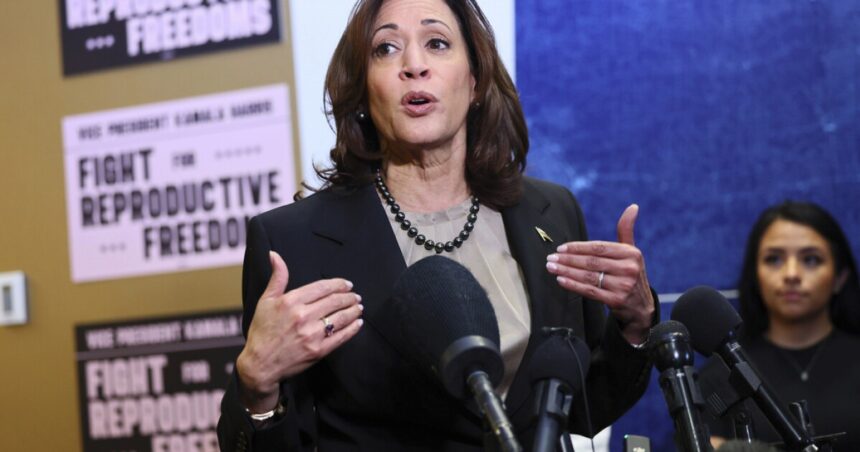The Biden-Harris campaign is traveling across the U.S. on Monday to discuss reproductive rights, three days ahead of the first debate of 2024 between President Joe Biden and former President Donald Trump where the issue is expected to be a focus.
Vice President Kamala Harris will visit Maryland and Arizona, as other lawmakers, officials, and women impacted by abortion restrictions hold more than 50 events including in key battleground states to mark the second anniversary of the Dobbs v. Jackson ruling on Monday.
“The vice president will remind voters that Donald Trump is responsible for overturning Roe and the chaos that has followed, and she will highlight the threat a second Trump presidency would pose to reproductive freedom nationwide,” a campaign official said.
Ahead of the two-year anniversary, the campaign launched an organizing effort that sought to cast Trump as the “architect” of the Dobbs decision at events across the nation. The campaign, which views reproductive rights as a galvanizing issue for Democrats, has tried to underscore what it views as the stakes of the election on reproductive health care, including a national abortion ban under a Trump administration.
“Decades of progress shattered just because the last guy got four years in the White House,” President Biden said in a new video released Monday as part of the effort. “We’re up against extremism.”
President Biden called Trump “the sole person responsible for this nightmare,” in a statement. “If given the chance, there is no question he will ban abortion nationwide, with or without the help of Congress. You don’t have to take my word for it – his advisers have already laid out the plans to do it. I will never let that happen.”
The Biden campaign released a new ad Monday lambasting Trump for the Supreme Court’s decision. It features Kaitlyn Joshua, who was turned away from two emergency rooms during a miscarriage.
Trump takes credit for Dobbs decision
Ahead of the anniversary, Trump touted the overturn of Roe and his appointing of three conservative justices to the high court that paved the way for the decision.
“We have also achieved what the pro-life movement fought to get for 49 years and we’ve gotten abortion out of the federal government and back to the states,” Trump said at a conference of evangelical voters Saturday, adding that “it’s working out right now.”
“Like Ronald Reagan, I believe in exception for the life of the mother– rape and incest,” Trump added. “Some people do, I think most people do, some people don’t. You have to go with your heart, but you have to remember you have to get elected.”
The Trump campaign has tried to paint Democrats as “extremists.”
“The truth is that the Dobbs decision returned the power back to the people in every respective state to make decisions on the issue of abortion. Some states will be more conservative and some will be more liberal, but as President Trump has consistently stated, he supports the rights of individuals to determine their laws. President Trump also strongly supports ensuring women have access to the care they need to create healthy families, including widespread access to IVF, birth control, and contraception, and he always will,” said Karoline Leavitt, a Trump campaign national press secretary.
State policies differ wildly since Dobbs ruling
Since the Supreme Court overturned the right to abortion in its decision in Dobbs v. Jackson in 2022, 14 states have total abortion bans, with more enacting varying restrictions, creating a patchwork of laws across the country.
“Women are being denied access to emergency care to preserve their health,” said Jennifer Klein, director of the White House Gender Policy Council. “They’ve been forced to go to court to ask for reproductive health care, and some have been even forced to travel to other states to get lawful medical care.”
White House officials expect President Biden and Harris to continue highlighting efforts to preserve abortion rights ahead of the election.
“We’re going to continue to talk about impact. We’re going to also continue to talk about the work that the Biden-Harris administration is doing on reproductive rights, the policies we’ve been putting in place, everything from defending access to [abortion] medication to strengthening privacy rights for patients and providers, to expanding access to birth control,” said Katie Keith, deputy director of the White House Gender Policy Council.
While the administration has pursued steps around access to emergency care, contraception, and IVF in the wake of the decision, it continues to call on Congress to pass legislation enshrining abortion rights.
“Republicans have voted against contraception and have voted against IVF. There were very recent efforts by Democrats to bring those votes to the floor. They had those votes, and those votes failed. We’ll be more than happy to work with anybody who wants to protect reproductive rights, reproductive health, reproductive freedom,” said Klein.
Public opinion on abortion rights
The issue has become significant in the election. More voters said they will only vote for a candidate who shares their views on abortion than before the Supreme Court’s decision, according to Gallup, which also finds the majority of adults, 54%, identify as “pro-choice” while 41% identify as “pro-life.”
A KFF survey found a majority of women believe the election will have a “major impact” on access to reproductive healthcare in the U.S. The same survey found the majority of Democratic and independent women voters supported a law guaranteeing a nationwide right to abortion, while the majority of Republican women voters supported a nationwide abortion ban at 15 weeks. Most women voters across party lines supported laws protecting abortion access in case of pregnancy-related emergencies.
The Dobbs v. Jackson ruling was not the final time the Supreme Court needed to weigh in on abortion rights. Officials are waiting to see how the Supreme Court rules in another major case on reproductive care, Idaho v. United States. The Biden administration believes the Emergency Medical Treatment and Labor Act preempts state bans and provides for emergency care, including abortion.
The administration is confident in its interpretation, according to Keith.
We “are defending that position all the way up to the Supreme Court. Right now we are exploring, looking through our different policy options and levers there. I think much will be determined by what the court’s decision says,” said Keith.
“There are things that we can do, there are policies, but honestly, we need to be mindful of the fact that, as the president said about Dobbs, you can’t replace a federal statute with some individual policy actions,” Klein said.
Related stories:
Texas woman who left state for ’emergency’ abortion is pregnant again
Supreme Court allows abortion drug mifepristone to remain widely available in US





